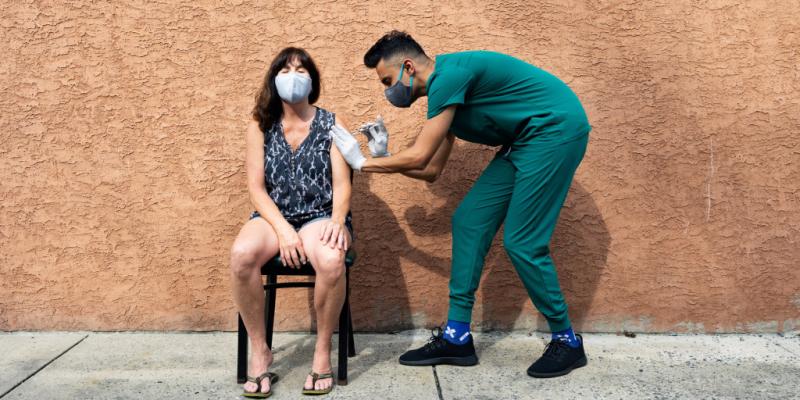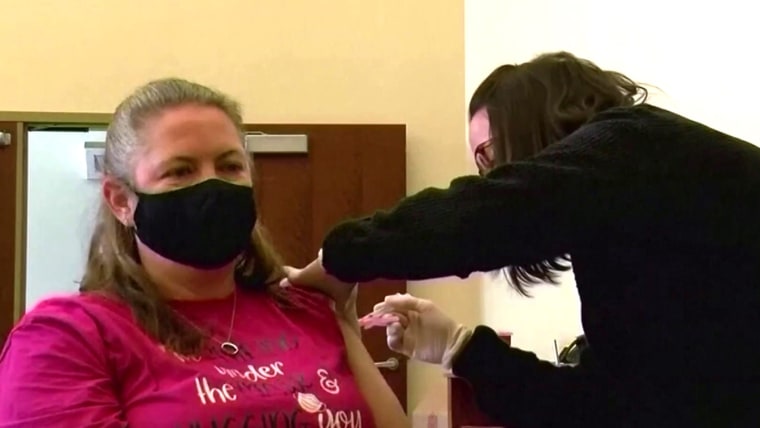Why eight months? What's behind the timing of the Covid booster shot
Category: News & Politics
Via: perrie-halpern • 3 years ago • 18 commentsBy: Erika Edwards and Elizabeth Chuck



Federal health officials are expected Wednesday to present evidence for why people are likely to need Covid-19 boosters eight months after their second doses of a vaccine, according to sources with the Centers for Disease Control and Prevention.
The eight-month time frame is most likely based on findings from both the U.S. and abroad looking at how the vaccines have held up over time — and whether they can stand up to the hypertransmissible delta variant of the coronavirus that has overtaken the country.
"Delta is forcing this discussion" on boosters, said Dr. Colleen Kraft, associate chief medical officer at Emory University Hospital in Atlanta.
The variant now accounts for nearly 100 percent of new Covid-19 cases in the U.S., according to the CDC. The seven-day average of Covid-19 cases has soared by 700 percent since the beginning of July, when delta became the dominant strain in the U.S.

US to advise boosters for most Americans 8 months after vaccination
Questions remain about how well the vaccines fare against the delta variant, as well as whether protection simply wanes over time. Indeed, experts said they are eager to see any new data that led to the government's proposed timeline for booster shots.
Data from countries that began their vaccination campaigns before the U.S. provide important clues to when boosters might be needed here.
Limited research from Israel, one of the first countries to begin widespread vaccination, which has almost exclusively used the vaccine from Pfizer-BioNTech, is likely to have played a role in the administration's expected rollout of timing for booster doses, doctors said.
"The data are strongly suggestive that people who got vaccinated early in Israel — that is, in January — are seeing infections in the vaccinated at a higher rate than people who got vaccinated in April," said Dr. Sankar Swaminathan, chief of the infectious diseases division at University of Utah Health.
Data posted on the Israeli Health Ministry's website indicate that the vaccines administered to people over age 65 in January now offer just 55 percent protection against severe illness.
That's a concern, particularly with how contagious the delta variant is, said an expert in pulmonary and critical care, Dr. Benjamin Singer, an assistant professor of medicine at the Northwestern University Feinberg School of Medicine.
The variant has been associated with breakthrough infections, and while such infections are rare and generally much less severe, studies indicate that fully vaccinated people can spread the virus if infected.
As for why the booster shots would be recommended at eight months, Singer said, "it's not entirely clear, but it's probably a combination of waning immunity over time and the fact the current circulating variants are just that much more contagious and spread that much more easily."
Still, the data from Israel come with caveats. Swaminathan said those who got vaccinated the earliest there were in high-risk populations, who may already carry a higher chance of getting breakthrough infections, making it unclear whether their risk of infection or hospitalization eight months out would match that of the general population.
Dr. Peter Hotez, dean of the National School of Tropical Medicine at Baylor College of Medicine and co-director of the Texas Children's Hospital Center for Vaccine Development, said, "All we're getting is snippets of data on the Israel Ministry of Health website." He said he was curious whether, in addition to a decline in efficacy against mild infections, there was a significant drop in protection against hospitalizations for vaccinated people over time.
John Grabenstein, a former executive director of medical affairs for vaccines at Merck, as well as a former immunologist for the Defense Department, agreed that more data need to be presented.
"The Israeli data is a snapshot, and I don't want to make a quick decision based on one snapshot," Grabenstein said. "I want to see multiple pictures, multiple views of the same thing, with the numbers beginning to coalesce around the same conclusion."
A recent study from the Mayo Clinic, however, also suggested waning immunity from the vaccines. The research, which hasn't yet been published in a peer-reviewed journal, found that protection against infection during the height of the delta variant's spread fell to 76 percent among those who had received the Moderna shots and 42 percent among those who got the Pfizer shots.
"There seems to be a dip in terms of immune responses," said an author of the paper, Dr. Abinash Virk, an infectious disease specialist at the Mayo Clinic. Her team is trying to determine whether the dip is truly due to waning immunity or whether the delta variant is mostly to blame.
"It's really difficult to sort this all out, because this is all happening concurrently," Virk said, adding that mask mandates also went away as the delta variant began spreading.
Some doctors questioned why the U.S. guidance appeared to be a blanket recommendation for everyone.
"What's surprising about it is that it may be a universal recommendation that is based on time rather than on risk factor, and that would seem to be me to be a bit unusual, especially when we look at the rest of the planet, who have, in some areas, very low access to vaccines," said Dr. Buddy Creech, director of the Vanderbilt Vaccine Research Program at the Vanderbilt University Medical Center.
It's also not clear what effect booster shots could have on the trajectory of the pandemic.
Some predicted that boosters could reduce serious infections among immunocompromised people or others at high risk for complications. But to make a real dent in reducing transmission — the key to ending the pandemic — those who haven't gotten vaccinated at all will have to get their first doses, Singer said.
"The boosters probably have a limited impact on reducing the worst impacts, because it's really unvaccinated people who are making up the supermajority of hospitalizations, ICU admissions and deaths," Singer said. "If you have less infection, including breakthrough infections, you might break that train of transmission, but if you're looking now, most of the transmission is occurring among people who have had zero vaccines."

Tags
Who is online
456 visitors

Will the usual suspects deem this to be scare tactics so that officials can "gain more power" over the citizenship?
So what does it take to convince some people that the risk of being unvaccinated is much greater than the risk of potential side-effects of a vaccine that has been field tested across the planet with 1.85 billion people being fully vaccinated and over 4.7 billion shots administered ?
Tell them, persuade them through repetition, that. . . hordes of the vaccinated from across world seas are coming to the U.S. A. to fill in the spots they leave behind and have their possessions.
I'd like to see data on the infection rate among those vaccinated early who are not seniors. I'm absolutely not against vaccination, and I was vaccinated early, but I had such an uncomfortable reaction to my second dose of the Pfizer vaccine that I'd like to put off a booster dose until I really need it.
This is what the CDC has for breakthrough data. It isn't much. -
The second Moderna put me in bed for a day, but I needed the rest anyway. I had snacks, water, and plenty of DVD's. I expect a repeat with a booster, smoke a fat one, sleep, and just make lemon aid out of lemons,
I had a sore arm with the first Moderna shot, the second knocked me down as if I had the flu - no fever, just all the aches & pains & feeling like shit. I spent 2 days in bed sleeping - didn't eat anything but toast & drank a lot of water.
My hubby also slept a lot with the second Moderna.
My son had massively sore arm - couldn't raise it shoulder high.
My immune compromised daughter had no effects from either except for a slightly sore arm as with her flu shot.
I had the Moderna vaccine and the second dose was a non-issue for me. I didn't even have a sore shoulder muscle. My shoulder was sore after the first dose and I felt like I was in a fog for the first day or so. I'll get this booster when they say I'm ready for it.
For about a month after, I had low level body aches but it did not inconvenient me much. It was kind of like when I would do yard work all day.
I will take the booster (in January thereabouts). We will have "great background" on the boosters by then - lucky me. Right now, I am mildly "alarmed" about (additional) vaccinations occurring in less than yearly intervals which I have grown accustomed (yearly intervals that is.)
(I watched the CDC briefing today that will help me understand better what the science is on the booster.)
We're all on a learning curve here.
I contracrted covid back in 4/20.
Still experiencing all signs and symptoms.
They tell me that I am a long hauler.
And we will continue to be. As much as that sucks, it's the reality we have to learn to live with.
That seriously sucks. Fortunately, I guess anyway, that was pre "Delta" which is from what I've been told is more severe for the unvaccinated than the original "alpha".
Good luck and well wishes for the future.
Do people like yourself get the current vaccines? I've heard the reactions to the vaccines for previously infected have been often times as bad as if not worse then the virus itself.
Sorry to here it. I got it bad on 4-4-21 and spent 27 days (7 in ICU, 9 in general population, and 11 in patient at home) and will have COPD the rest of my life. And I just got my second Moderna shot on 7-6-21
Glad you're alive.
That seriously sucks but is controllable as long as you take the necessary precautions and medications.
How did that go? I know a couple of people that had covid before getting vaccinated and really suffered when they got the vaccine. In fact, one died from the reaction, but to be honest, she was lucky to be alive considering her health issues to begin with.
And you.
Do you now have an insatiable appetite for fortune cookies? -s-
First shot got a fever the next afternoon and was shaking so bad I couldn't type or operate my mouse and had to go home. Went to sleep at 4:00pm and woke up at 6:30 thinking I had slept for 14 hours and it was Wednesday (the next day) morning. Fever was 102.8. Even texted work I wouldn't be in until I realized it was 6:30pm on Tuesday. Slept like a baby the rest of the night.
Second one, I woke up the next morning with a fever and body aches and didn't work that day either. But no hallucinations like the first one LOL
Hmmm - had the 1st Moderna shot - went home, took a 3 hour nap - all was well afterwards. Got the 2nd shot - went home, took a 6 hour nap - all was well afterwards. No pains, soreness, headaches - nothin.
Guess I'm just one of the fortunate ones, eh?
You and me both. But I didn't take the nap!! And the wife and I both got the Moderna vaccine.
The worst I suffered was minor tenderness at the injection. In fact, to this day I get a minor twinge right at the injection site every so often.
My wife didn't fare quite as well. She had no major issue other than soreness after the first shot. The second shot she ran a fever, had chills, headache and all the other problems people have. Unless she was using that as an excuse to stay in bed for a couple of days and use me as a butler!!
Sorry to hear you are still having issues. That's tough.
I had COVID back at the end of November into December of last year. It was like a horrible case of sinusitis (which I'm extremely susceptible to anyway) where I had no energy and was completely stuffed up for weeks. Fortunately I didn't need hospitalization nor seem to have lasting symptoms. Got my vaccine shots in May of this year so a booster would be out somewhere in January of next year.
I took the Sputnik V vaccine in March, I haven't had any side effects.